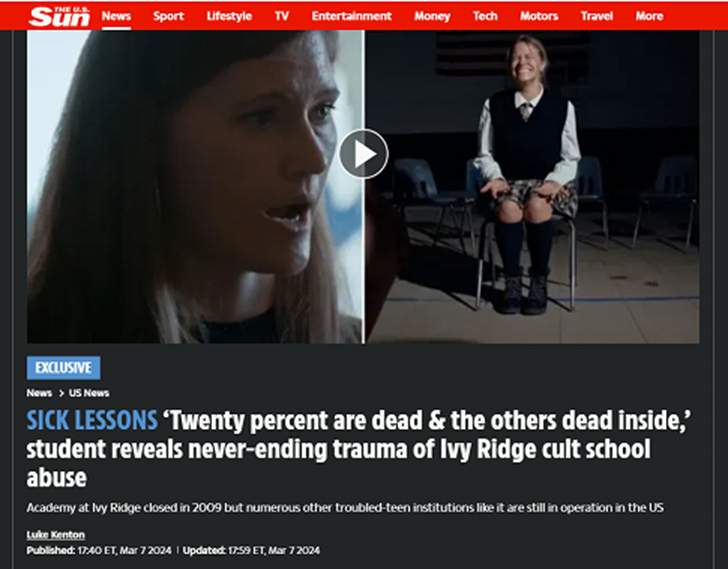
A FORMER student of an abusive troubled-teen academy scrutinized in a shocking new Netflix doc said his horrifying experience at the school has left him encumbered with ceaseless trauma.
Eddie Curley was secretly enrolled in the Academy at Ivy Ridge in the summer of 2002 by his parents, a week after his 17th birthday.
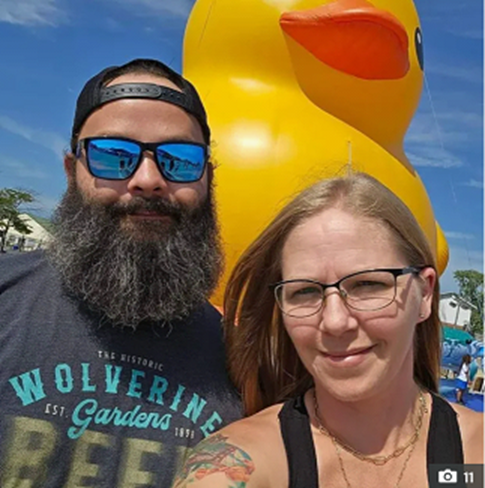
Eddie Curlie, pictured with his wife, Christy Curley, shared his story for the first time with The U.S. SunCredit: Courtesy of Eddie Curley
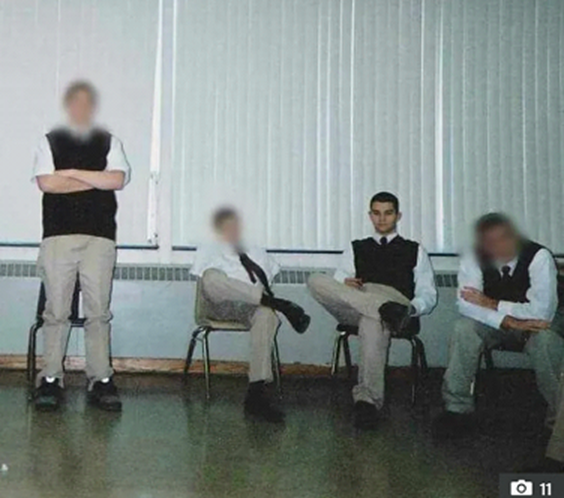
Eddie (second from right) attended the Academy at Ivy Ridge between 2002 and 2003 when he was 17Credit: Courtesy of Eddie Curley
The varsity sports star was kidnapped from his bed in the middle of the night by two strange men, handcuffed, and driven for hours in the dark, destination unknown.
He would spend the next nine months at Ivy Ridge, where he and dozens of other students - deemed too problematic for mainstream schooling - were subject to crowded living quarters, cult-like brainwashing, psychological torture, and physical abuse.
Students at Ivy Ridge were forbidden from talking to one another, making eye contact, or showing any emotion.
They were also ordered to walk the halls in single-file lines, sleep with the lights on, and prohibited from staring out the window.
Even the smallest transgression could result in physical punishment, including solitary confinement, and Eddie told The U.S. Sun there was barely a day that went by that he didn't witness one of his classmates being restrained, abused, or belittled by a staff member.
With more than two decades having passed since he walked out of Ivy Ridge's doors, Eddie says he is still reeling from the psychological and emotional trauma he endured throughout his stay at the school.
His parents' betrayal and the frightening nature of his abduction continue to haunt him.
Eddie said that almost every single child enrolled at Ivy Ridge left significantly worse off compared to when they entered.
"There's probably less than one percent of people who went to Ivy Ridge that left unaffected or who at least did okay," said Eddie, 39.
"I would say more than 20 percent are either dead from suicide or addictions and overdoses, and I would say the remaining 79 percent are all dead on the inside."
Eddie never told his parents of the horrors he was subjected to at the school and never confided in any of his friends back home because he thought nobody would believe him.
But he felt encouraged to come forward with his story for the first time after Netflix announced it would be teaming up with Katherine Kubler, who attended the school in 2004, for a new three-part documentary about Ivy Ridge, titled, The Program: Cons, Cults and Kidnappings.
In the documentary, Kubler claims at least 40 of her Ivy Ridge contemporaries have died by suicide or overdose, while countless others report suffering deep mental health issues.
For Eddie, readjusting to life outside of Ivy Ridge was incredibly difficult.
He is no longer in communication with his parents and hasn't spoken to either of them for seven years.
For a time, he ran afoul of the law, but he has since gotten himself back on the straight and narrow, marrying the love of his life, becoming a stepfather to two children, and launching a successful painting business and BBQ restaurant.
But he admits he struggles to accept the positives and enjoy the successes in his life, at times, because of the sense of worthlessness instructors at Ivy Ridge attempted to drum into him.
"I’m in a great place in my life but it’s just that stuff from school, it’s like a golf handicap," Eddie said.
"But I'm in a better place and it’s because of this s**t coming out [on Netflix]. All I've ever wanted since walking out those doors is for the abuses to be exposed.
"I needed to get it off me. I don’t want to be under it anymore [...] but it's just something I've had to f**king deal with.
"Being completely blindsided by the people I love - or the people I used to love because I won't have a relationship with them again - was so hard.
"I'm in the best financial situation I've ever been in my life, I have an amazing wife and family, but mentally that's a different story.
He continued, "We struggle with this s**t every day [...] life after Ivy Ridge, I don't look forward to anything, I'm not sad about much, except for this s**t apparently.
"There’s no reward in feeling and always thinking I should be doing more; making more money, having a bigger house - there's just no feeling of gratitude.
"But I hope [that one day I'll feel different], honestly, maybe, but it would take a lot."
IVY RIDGE: A DE FACTO PRISON
The Academy at Ivy Ridge opened in 2001 and billed itself as a disciplinarian boarding school.
The school's brochure promised hiking, team sports, horseback riding, group-based learning, and a place for troubled children to ultimately thrive and reach their full potential.
The reality was much darker.
Ivy Ridge operated in affiliation with the controversial and scandal-ridden World Wide Association of Specialty Programs and Schools (WWASPS), founded by Mormon Robert Lichfield in 1998.
It was one of 20 WWASPS schools across three countries, giving it an aura of international scholastic authority. But it was, in fact, primarily a highly lucrative de facto prison where vicious abuse went unchecked.
At its peak, Ivy Ridge had 600 students all paying nearly $4,000 per month, allowing it to rake in over $20 million a year.
The school had a bizarre and convoluted points system designed to keep students in "the program" for as long as possible to ensure their parents kept shelling out tens of thousands of dollars a year in tuition.
However, many of the faculty members weren't even qualified to teach children, and the "diploma" that students received upon graduation from Ivy Ridge was worthless and not officially recognized by the state of New York.
For Eddie, his entanglement with Ivy Ridge began with the flick of a light switch in October 2002 at his parent's home in Delaware.
He awoke at 3 am to find two men, dressed in combat boots and fatigues, towering over him at the edge of his bed.
Alright, you need to get up. You're coming with us," he remembers the men telling him as his eyes were still adjusting to the sudden invasion of artificial light.
When his vision finally recalibrated, Eddie noticed that one of the men was holding a pair of handcuffs.
He screamed out for his mom and dad, but his desperate cries for help went unanswered.
"The escorts then told me, 'We can do this one of two ways: the easy way or the hard way,'" recounted Eddie.
"I asked what the easy way was, and they said to come down the stairs voluntarily.
"So I walked out into the hallway and my mom was there cowering in the bathroom door crying, but she didn't look at me.
"And I don't recall seeing my dad there at all."
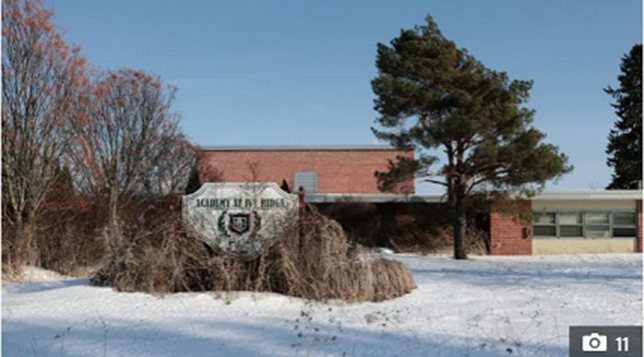
The Academy at Ivy Ridge opened in 2001 and closed its doors eight years later. The site is now abandonedCredit: Courtesy of Netflix
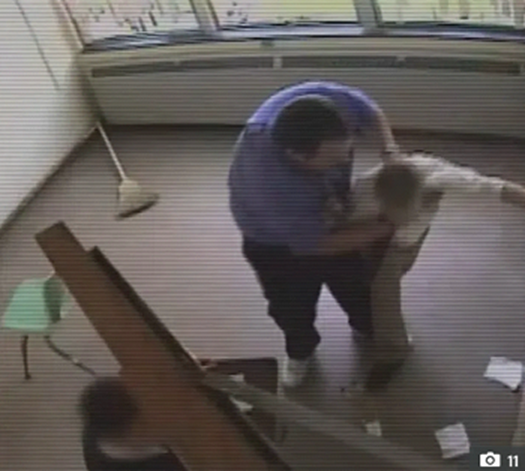
Children at the school were subject to physical, psychological, and even alleged sexual abuseCredit: Netflix

The school is profiled in the new Netflix documentary, The Program: Cons, Cults and KidnappingsCredit: Netflix
Before walking outside, Eddie told the men he wouldn't take another step until they let him find his shoes and put them on.
"I told them I'm not doing another f**king thing until I see my shoes," said Eddie.
"My mom told the escorts not to give me shoes because, 'He's going to run if you put the shoes on.'"
Against his mother's advice, the men obliged and placed a pair of sneakers on Eddie's feet.
As soon as they stepped out the front door, Eddie shrugged off his captors and took off into the surrounding neighborhood as fast as his legs could carry him.
"It was like a horror movie," he said of the ensuing chase in the dark.
"I could draw you an accurate picture of the terrain around that house, and there's one hill and I ran into that hill and just fell over.
"The guy tackled me, I flipped over on top of him and considered hitting him but thought it wasn't worth it.
"And now, honestly, my biggest regret in my entire life - and I've had a few - is not fighting even harder to get away."
KIDNAPPED, AFRAID
Eddie was handcuffed and thrown into the back of a Ford Taurus, destination unknown.
The journey would last hours, and with only his thoughts for company, Eddie tried to make sense of the frightening chain of events that had unfolded that morning.
Eventually, he recalled an episode of Dr. Phil his mom had made him watch recently, in which problematic children were abducted from their beds in the middle of the night and taken to a boarding school.
It was then that he realized his fate.
But, refusing to go quietly, he attempted another escape when his escorts pulled over for a bathroom break at a service station in New Jersey.
As soon as the men opened the car door, he screamed out for help at the top of his lungs, shouting he'd been kidnapped.
Again, the pleas were made without reply.
"I just started f**king screaming because I'm in handcuffs with two strange men in a Ford Taurus that doesn't look anything like a cop car," Eddie said.
And you would've thought someone would've done something, but they didn't."
Resigned and tired, Eddie fell asleep and awoke a few hours later at a privately owned, for-profit disciplinary boarding school in Ogdensburg, New York.
But a warm welcome at the Academy at Ivy Ridge would not be forthcoming.
Instead, he was greeted by the director who was furious that he'd twice attempted to escape.
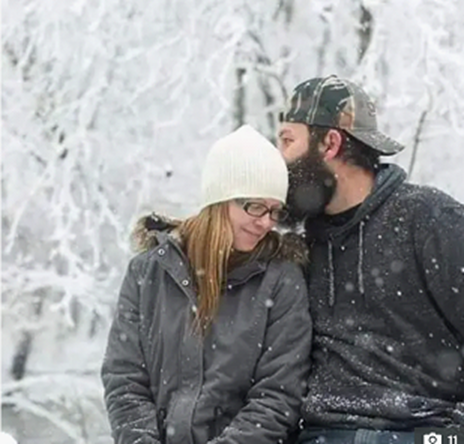
Eddie left the school after nine months and has since married and launched two successful businessesCredit: Courtesy of Eddie Curley
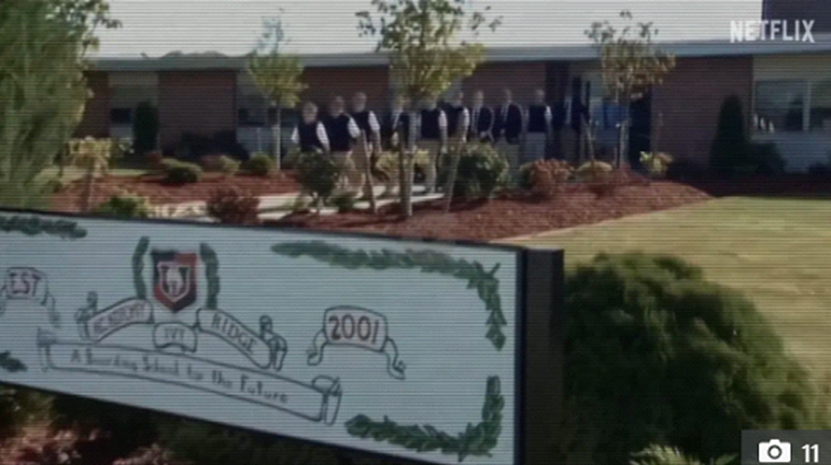
Ivy Ridge operated in affiliation with the controversial and scandal-ridden World Wide Association of Specialty Programs and Schools (WWASPS)Credit: Netflix
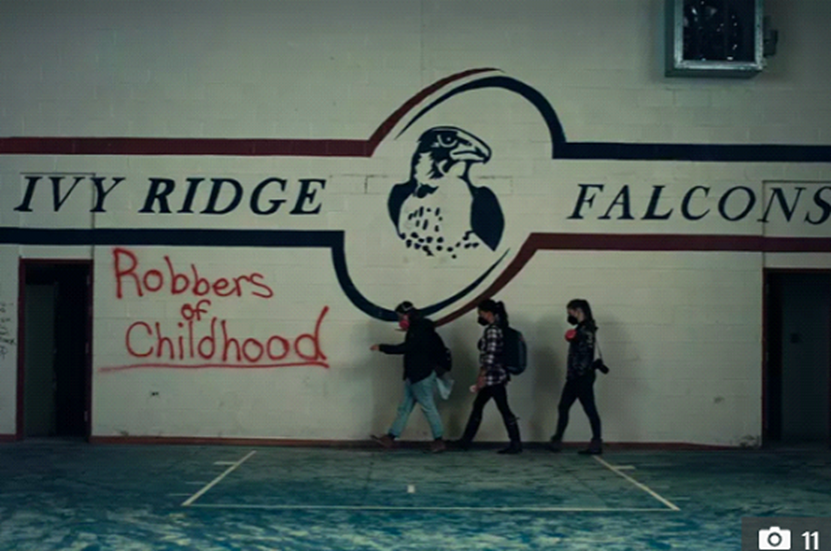
It was one of more than 20 facilities in the US, Czech Republic, and Costa Rica run by WWASPSCredit: Netflix
He was dragged by his collar upstairs and ordered to shave off his beard with a single-blade Bic razor and cold water.
As he tried to do so, the director kept pushing him in the back, causing him to cut his face and neck.
"Why don't you look out the window," Eddie remembers the director taunting him.
When he asked why, the director responded, "So I can tell everyone you tried to run again, and I'll put your face into the ground."
TRYING TO SURVIVE
Much of his first few days and weeks at Ivy Ridge remain a blur for Eddie today.
But he vividly remembers the burning resentment he felt toward his parents for sending him to such a facility.
Though conceding he had typical rebellious teenage tendencies - attending parties and enjoying the occasional drink with friends - Eddie was a good student, a very talented athlete, and by no means a troubled teen.
"I'm not gonna say I was some perfect angel because I wasn't, but I wasn't doing anything outlandish either," he admitted.
"I was a rebellious teen, but who wasn't?"
Eddie said no one catalyst event led to his parents enrolling him at Ivy Ridge.
But his father is a prominent family attorney in Delaware, and Eddie believes he was sent away as a precautionary measure rather than a reactionary one.
"The issue lays with the fact that my dad is a family court attorney in the state of Delaware, who's probably soon to be considered for a position on the bench as a judge," he said.
"So he couldn't have any kind of bad representation of our family name.
I just don't know how they could do it," added an emotional Eddie.
"Just trying to trust anybody, ever, after your parents do that to you.
"I was kidnapped out of my room with the blessing of the people that f**king made me, and trying to heal from that, I just can't.
"I don't know how they slept at night. But, honestly, they probably slept better, no longer having to worry that I was going to threaten to tarnish the family name."
SICKENING ABUSE
Eddie remembers Ivy Ridge as a militant environment where students were instructed to walk in single-file lines and forbidden from talking to one another or showing emotion.
Teachers encouraged students to snitch on one another for any infraction, however minor, and they rewarded them with points for doing so.
Those points could be used to redeem rewards and climb the ranks of the program to unlock special privileges, including monthly phone calls home and the ability to talk.
However, points would also be frequently deducted by staff if any student was deemed to have disobeyed Ivy Ridge's extensive code of conduct.
Those without enough points to cover their infraction would be subject to hours of writing out the school's rules over and over again and in some cases subject to physical punishment.
"If you got in trouble and you had no points, you would be asked to lie down on a tile floor on your stomach, with your legs straight out, your chin laying on the tile floor, and your arms by your side," Eddie said of one such penalty, known as observed placement (OP).
"You'd have to lay in that position for 15 minutes and not move while a staff member watched you.
"And if you moved they'd restrain you."
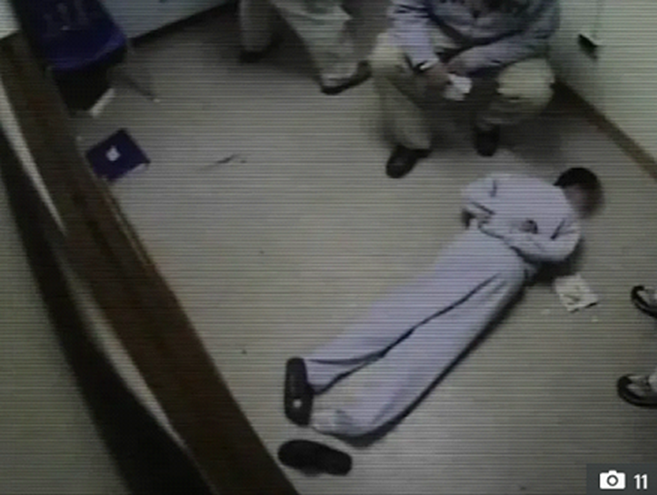
An example of observed placement in footage recovered from the school's surveillance camerasCredit: Netflix
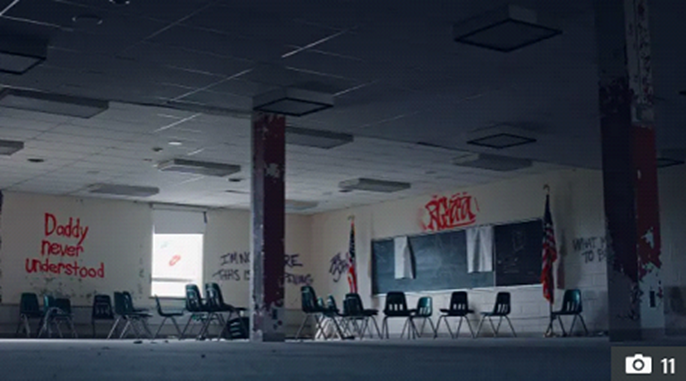
Some students spent weeks on end in solitary confinementCredit: Courtesy of Netflix

Eddie credited Christy with helping him deal with his trauma, calling her his biggest supporterCredit: Courtesy of Eddie Curley
Eddie said barely a day went by when he didn't witness staff physically restraining a child.
Students would be pinned to the ground for the smallest infractions, including looking out of the window for too long, Eddie said.
He remembers one student, Brad, who was punished and restrained more often than any other.
"Brad would probably, today, be diagnosed with nonfunctioning autism, and he was restrained daily," remembered Eddie.
"For nine months, I don't recall him ever being unrestrained. He was taken to the OP room all the time.
"This kid had been restrained in that room for so long, he had a boil the size of a half-dollar on his chin from an infection that I'm sure left him physically deformed.
"He would be physically thrown around the room, and onto his chest, in almost the George Floyd position, with knees dug into his spine and neck."
Today, Eddie is part of a Facebook group with other attendees of Ivy Ridge where survivors share memories from the school and offer support to one another.
None of the several hundred members has ever heard from Brad since leaving, he said.
"He was just a nonfunctioning autistic kid and he was just f**king being abused every single day," added Eddie through tears.
"It's disgusting, it's unforgivable."
PARENTS BEWARE
Eddie left Ivy Ridge in July 2003 after a nine-month stay.
He went back home to Delaware and moved out of his parent's home for good after just nine days.
More than anything else, he wanted to see Ivy Ridge and any iterations like it closed for good.
Of the more than 20 WWASPS facilities once spread across the US, Czech Republic, and Costa Rica, not one remains.
The Academy at Ivy Ridge shuttered its doors in 2009 after years of controversy.
However, the troubled teens industry remains a money-making machine in the US, and numerous similar programs still operate today.
It's estimated that upward of 100,000 teenagers are currently enrolled in programs akin to the kind experienced by Eddie, raking in a billion dollars per year.
Eddie urged any parents considering sending their child to one of the programs to think twice.
"I would probably ask if they’re doing it to help their child, or if they’ll enjoy the convenience of their child’s solitude.
Source Link: https://www.the-sun.com/news/10601905/academy-ivy-ridge-abuse-school-netflix-doc-student-trauma/





